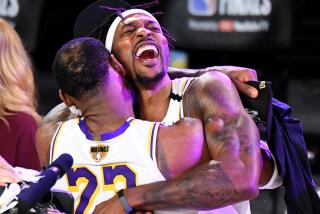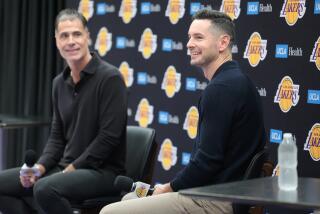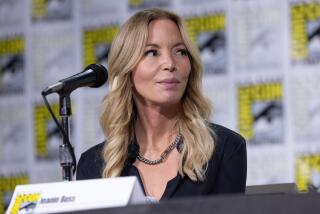THE BIG EXIT
Was it really only 36 days ago that the biggest question facing the Lakers was whether they could sweep the Detroit Pistons in the NBA Finals or would require a fifth game?
Red Auerbach was in his Washington office, mulling over the idea of making a congratulatory call to Laker Coach Phil Jackson on winning a record 10th NBA title.
Laker center Shaquille O’Neal was gazing up at the championship banners on the Staples Center wall, vowing to surpass the five won by the “Showtime” generation.
Owner Jerry Buss was being lauded for that rarest of sports accomplishments, building a second dynasty after the first had fallen apart.
And behind the scenes, the final details were being worked out for yet another June victory parade through downtown L.A.
And then, suddenly, quickly, stunningly, it all crumbled, a collapse as unforeseen as the tearing down of the Berlin Wall, and perhaps just as momentous in the basketball universe.
Today, the Pistons rule as NBA champions, Auerbach is undoubtedly puffing on a cigar, secure in the knowledge that he still shares the record for coaching championships, Jackson has departed, probably for the peace and quiet of his beloved Montana, to ponder life without basketball, O’Neal is preparing for a welcoming parade of sorts in Miami, and Buss is vacationing in Italy, not far enough removed to avoid the heaviest barrage of criticism he has received since buying the Lakers in 1979. One talk-show host went as far as to question Buss’ mental competence.
Buss has considerably loosened his grip on the day-to-day operation of the club in recent years. He rarely goes into the team’s El Segundo office, having handed over the majority of his duties to daughter Jeanie, who has done an admirable job, according to most of those who interact with her.
But it is her father who still makes the final decisions. Until now, those decisions have made him the most successful owner in L.A. sports history. But now, he faces an uncertain future as well as a glorious past, a future of his own making.
When he bought the team from Jack Kent Cooke, Buss made his first and wisest decision. He knew finances, he knew marketing, he knew entertainment value and he knew basketball, but the latter only from a fan’s point of view.
So he told Jerry West, then departing as coach, “Please help me out. I’m new. I don’t know what I’m doing.”
West and Bill Sharman became Buss’ brain trust. It was West who decided Pat Riley should be the head coach after Paul Westhead was fired, West who drafted James Worthy over Dominique Wilkins and Terry Cummings.
After Kareem Abdul-Jabbar voluntarily retired and Magic Johnson involuntarily retired after contracting HIV, the first half of the 1990s became lean years for the once-proud franchise.
By the end of the 1995-96 season, the Lakers had not been in the NBA Finals in five years, the event becoming Michael Jordan’s personal showcase.
But in that off-season, West mixed and matched from both the likeliest and unlikeliest of places to get the building blocks for another dynasty. He went to the top of the free-agent list, a small college in Arkansas and a high school outside Philadelphia.
It was at that high school, Lower Merion in Ardmore, Pa., that West found 17-year-old Kobe Bryant.
The late Chick Hearn, the Lakers’ long-time broadcaster and former assistant general manager, recalled West’s calling him breathless one afternoon.
“You been running?” Hearn asked him.
“No,” said West, “but I’ve just seen a 17-year-old kid I’ve got to have.”
“You’ll get him,” Hearn assured West.
He did, but it wasn’t easy. After drafting Bryant with the 13th pick, the Charlotte Hornets traded Bryant to the Lakers for center Vlade Divac on June 26.
That left West with his boy wonder, but no center. The plan was to sign O’Neal, the property of the Orlando Magic until July 11, when O’Neal would become a free agent.
It was a gamble, but one that Buss heartedly endorsed.
At 2 p.m. on July 11, O’Neal officially became a free agent. At 3 p.m., Leonard Armato, his agent, was in West’s home.
“It was nervous time,” said assistant coach Bill Bertka. “We had traded our starting center to shoot for the moon.”
The Magic made an initial offer of $54 million over four years. Buss opened his checkbook and told West to do whatever he had to do.
On July 18, for $120 million over seven years, O’Neal agreed to put on a purple and gold jersey.
So did a little-known guard named Derek Fisher, drafted with the 24th pick in the 1996 draft by West out of Arkansas Little Rock.
At the beginning, this was hardly a team for the ages, partly because of a disparity in ages. Though still a teenager, the headstrong Bryant wanted the ball. O’Neal, already a dominant force in the league, demanded the ball.
The problem was, there was only one ball.
Before anyone could think of hanging new banners on the wall, the Lakers needed a coach/referee/peacemaker/counselor.
They found one in Jackson, whose six championships with the Chicago Bulls -- Jordan or no Jordan -- gave him immediate credibility.
The Lakers won championships in their first three seasons under Jackson.
The problems were still there. O’Neal and Bryant still snapped at each other on occasion, still fought for leadership of the team. But whenever the season hung in the balance, they gave each other grudging high-fives, put their egos on hold and became again the best one-two punch in the game.
And whenever they needed to be prodded in that direction, West, their father figure, was there, too nervous to actually sit in a seat to watch a playoff game, but never shy about telling O’Neal and Bryant what he thought about their behavior.
But then, the first shoe dropped. West, claiming burnout, left the Lakers for retirement only to resurface as president of the Memphis Grizzlies.
Still, when the Lakers, after being knocked out of the playoffs last season by the San Antonio Spurs, signed veterans Karl Malone and Gary Payton in the off-season, it was hoped their talent and veteran presence would serve as a buffer between O’Neal and Bryant.
Then came June 30, 2003, when Bryant was accused of sexually assaulting a hotel worker in Colorado. He says they had consensual sex. Bryant’s legal troubles seemed to alienate him from his team and further widen his relationship with O’Neal. They exchanged angry words through the media when Bryant failed to report on the opening day of training camp and had only an uneasy truce at best after that.
When Buss came by Bryant’s Newport Beach house to watch part of the Super Bowl in February, eyebrows were raised.
Had he taken sides in the team’s power struggle?
That certainly seemed to be the case when Buss, in a nationally televised interview, said that signing Bryant, a unrestricted free agent at season’s end, was his top priority.
Negotiations on a new contract for Jackson were suspended and O’Neal’s demand for a maximum contract extension went unfulfilled.
Then, after the Lakers were beaten by the Pistons in five games, there was the final proof, in O’Neal’s eyes, that he had lost all leverage and favor with his owner.
Jackson was told he wouldn’t be offered a new contract, and Laker General Manager Mitch Kupchak told the media, “We’re not going to trade Kobe. We’re just not going to do it. Period.”
Asked whether he could envision trading O’Neal, Kupchak said, “Well, um, he has a lot to do with that as well.”
Unconditional support for Bryant. Appreciably less than unconditional for O’Neal.
His pride hurt, his salary demands unmet, his role on the team unclear, O’Neal had had enough.
Find me a new home, O’Neal angrily told the Lakers.
Saturday, they did.
More to Read
All things Lakers, all the time.
Get all the Lakers news you need in Dan Woike's weekly newsletter.
You may occasionally receive promotional content from the Los Angeles Times.






